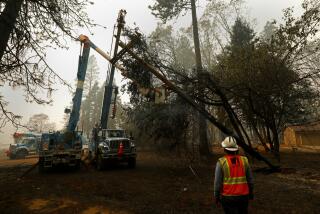Trial Ordered in WPPSS Nuclear Bondholder Suits
- Share via
OLYMPIA, Wash. — Washington’s Supreme Court on Thursday ordered a trial on some aspects of bondholder suits against the Washington Public Power Supply System, its professional advisers and others involved in the system’s $2.5-billion bond default on two defunct nuclear power plants.
The 6-3 opinion overturned the complete dismissal by the King County Superior Court of both individual and institutional bondholder suits.
The suits were against WPPSS, public utilities and electric cooperatives in states that were participants in the two plants.
The state high court ruled that state securities laws apply to the bonds sold to build WPPSS’ nuclear plants Nos. 4 and 5, which were canceled because of financing difficulties and because the demand for electricity in the region had been overestimated.
It also reinstated the claims of institutional investors--who intervened late in the case--that they were victims of common law fraud and misrepresentation. Although the court sent the case back for trial on those issues, it upheld dismissal of all other aspects of the suits.
All but three of WPPSS’s 23 utility members agreed to the financing plan for the two plants, agreeing to pay for their shares of the projects whether they produced power or not.
Others joining in the projects were seven cities and four public utility districts in Oregon, five Idaho cities, and 43 rural electric cooperatives in Washington, Idaho, Montana, Nevada, Oregon and Wyoming.
Revenue bonds on the projects were sold starting in 1977 and, when default was triggered in 1982 by the WPPSS board’s decision not to complete the two partially built plants, the total face value of outstanding bonds had reached about $2.25 billion. In 1984 and 1985, the court ruled in predecessor cases brought by bond trustees that the utility agreements were unenforceable.
The current suit was started in 1984 by individual bondholders who were denied intervenor status in the original cases and was subsequently joined by institutional bondholders, American Express and United States Trust Co. of New York.
Besides WPPSS and the utilities, defendants include professionals who advised WPPSS and prepared the bond sales. They include accountants Ernst & Whinney, investment advisers Blyth, Eastman, Paine Webber and its officers, engineers R. W. Beck & Associates, United Engineers & Constructors, Ebasco Services and bond attorneys.
The bondholders claimed that all defendants should have known the bond market could not support such massive sales needed to finance the two plants and that the defendants had provided inaccurate and inadequate information to the system and misled purchasers of the bonds.
All of the claims were dismissed in October, 1985, by Superior Court Judge Terrence A. Carroll, who ruled that all were legally insufficient to get the case into court.
But the state Supreme Court, in its majority opinion by Justice Robert F. Brachtenbach, said the lower court used improper standards when it rejected application of state securities fraud laws to the case.
More to Read
Sign up for Essential California
The most important California stories and recommendations in your inbox every morning.
You may occasionally receive promotional content from the Los Angeles Times.













